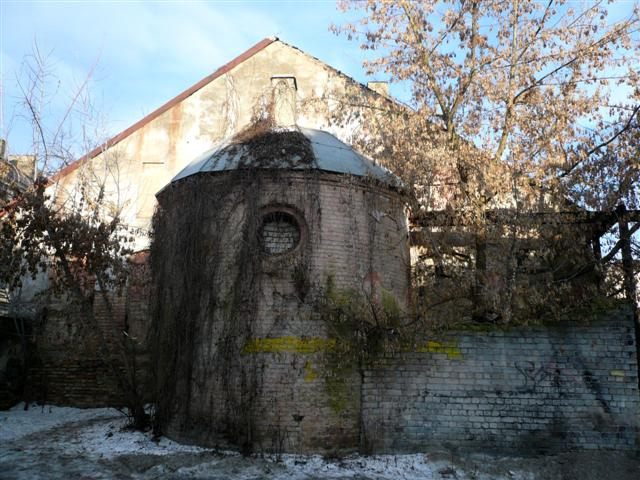Cultural Heritage Department to the Ministry of Culture of the Republic of Lithuania
Work is being done to stop the collapse of the Vilnius Synagogue (Gėlių street No. 6, Vilnius).
Until the work was started, the house of prayer was in a dangerous condition. The roof has holes and so the building is being affected strongly by the environment. Because of this some of the flooring and the internal cupola collapsed, the wooden roof construction was rotting and the mortar in the walls was decaying.
In order to avoid an accident and solve the dangerous situation, supports were put in place to hold up the wooden flooring and wooden rafters supporting the roof to keep it from caving into the building. Also, a wall of silicate brick and metal constructions which were obscuring the facade of the synagogue as well eroding the mortar in the original brick walls and thus endangering the entire building are being removed.
The Cultural Heritage Department has allocated over 50,000 litas [approximately 14,431 euros] from its Heritage Conservation Program for 2014 to carry out these tasks. The Vilnius Jewish Religious Community has allocated a further 5,000 litas. Architect Irena Staniūnienė drafted the plan to save the building.
Department director Diana Varnaitė said the work at the synagogue is mandatory. “Today the Vilnius Synagogue [sic] is one of only a few surviving in the capital city, while in the past in Vilnius, where there were many Jews, there were about one hundred. We must preserve the still-standing Jewish houses of prayer for future generations. This is not just out of respect to the Jewish community, but also to preserve the face of Vilnius, after all, we present the capital as the Jerusalem of Lithuania. But today, someone who didn’t know it was there might pass by it without even noticing, the synagogue is hardly recognizable. In order to return the building to its original appearance, much work awaits us in the future, but until that happens, we are doing what we can, stopping complete collapse and at the same preparing a plan of restoration work so that we can begin as soon as possible.”
The Vilnius Synagogue [sic] was built in the early 19th century between 1817 and 1833 on the site of a wooden building which once belonged to the merchant Zavel Peisakhovich. The synagogue was restored many times and much expanded in the second half of the 19th century. It operated until 1940. After World War II it housed storage facilities and apartments, and from 1990 on was abandoned to the elements.
[translator’s note: the synagogue in question is not generally known as the Vilnius Synagogue. Here is an excerpt from Vilnius: Sites of Jewish Memory, by Irina Guzenberg, Vilnius 2013:
“Zavel Germayze and David Levinson’s Synagogue, well known from the early 19th century, was located at Geliu street 6. After reconstruction in the late 19th century, the synagogue acquired its distinctive floorplan: a one-storey main hall and a section for women upstairs. In this synagogue, the young cantor Moshe Koussevitzky first exhibited his remarkable musical talent in 1925.
“Under Lithuanians law on property restitution, the synagogue was returned to the Vilnius Jewish religious community. The building is in poor condition.”
Legend has it that it was Vilna’s only 24-hour synagogue at one point, operating mainly for Jewish merchants fresh from the train station. Or at least it was open odd hours for travelling Jews.
It was generally known as the Zavl shul and Melikowsky, the father of Benzion Netanyahu and grandfather of the Israeli politician Binyamin Netanyahu, used to preach there.


